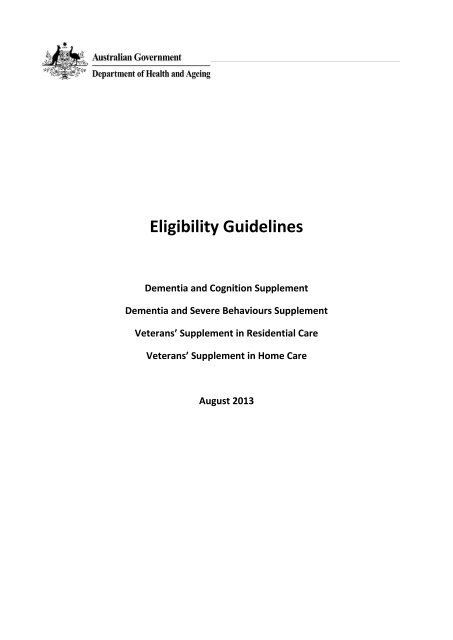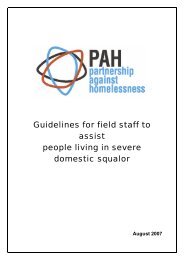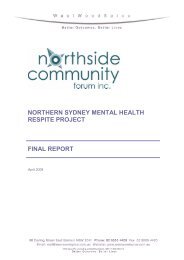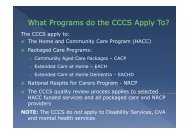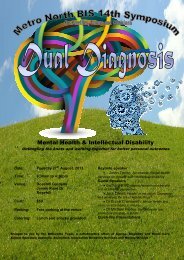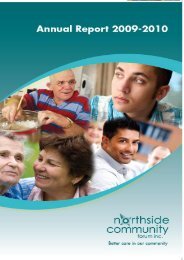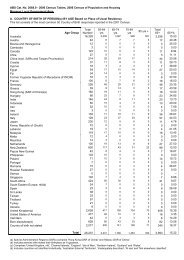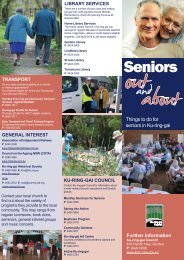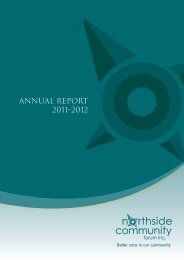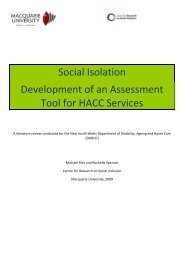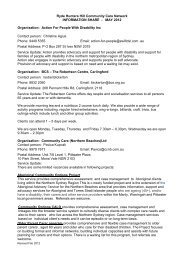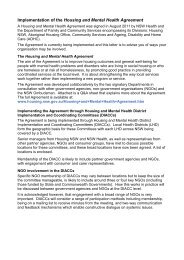Eligibility Guidelines
Eligibility Guidelines
Eligibility Guidelines
Create successful ePaper yourself
Turn your PDF publications into a flip-book with our unique Google optimized e-Paper software.
2 | P a g e G u i d e l i n e s - A u g u s t 2 0 1 31.2. Further informationThe <strong>Guidelines</strong> are primarily for use by Approved Providers of Home Care Program Packagesand residential care to assist them in claiming the supplements, although they have beenwritten with a broader audience in mind.The <strong>Guidelines</strong>, contact information and Fact Sheets for Approved Providers are available onthe Living Longer Living Better website 1 .Information and resources about Dementia care and management of severe behaviouraland psychological symptoms can also be found on www.health.gov.au/dementiaFrom 1 July 2013, older people, their families and carers can access theMy Aged Care website at www.myagedcare.gov.au or ring 1800 200 422, for informationabout aged care services.1.3. Evaluation of the SupplementsThe effectiveness of the supplements in meeting the care needs of eligible care recipientsand the impact on Approved Providers will be evaluated after the first year of operation.The evaluation will assess: the effectiveness and appropriateness of the assessment tools used to assesseligibility for the supplements; including how well they are being applied, their easeof use, and the scores used to determine eligibility; the effectiveness of the supplements in improving care outcomes in residential care,home care and other relevant aged care programs; and any other issues raised in the consultation process.An advisory group will assist in the evaluation. Information about the group and theprogress of the evaluation will be updated regularly on the Living Longer Living Betterwebsite.1 www.LivingLongerLivingBetter.gov.au
3 | P a g e G u i d e l i n e s - A u g u s t 2 0 1 32. The Dementia and Cognition Supplement in Home CareSpecific funding in the form of a supplement will be provided for care recipients withcognitive impairment, including dementia, for all levels of the Home Care PackagesProgram.The level of the supplement is linked to the level of the Home Care Package that the carerecipient is receiving. The supplement will be paid at the rate of ten per cent of the basicsubsidy amount payable for each of the 4 Home Care levels. Changes to subsidy andsupplement amounts (with indexation) usually take effect from 1 July each year.This section of the <strong>Guidelines</strong> should be read in conjunction with the Home Care PackagesProgram <strong>Guidelines</strong> which can be accessed on the Living Longer Living Better website. TheHome Care Packages Program <strong>Guidelines</strong> provide more detailed information about the newhome care arrangements, including matters that are relevant to the Dementia andCognition Supplement, such as home care subsidy levels, care planning and reviewprocesses, how the supplement should be included in the individualised budget, and theimpact of taking leave on the payment of the supplement.2.1 <strong>Eligibility</strong> criteriaThe Approved Provider has responsibility for ensuring an assessment of cognitiveimpairment is undertaken and documented prior to claiming the Dementia and CognitionSupplement.A care recipient may attract the Dementia and Cognition Supplement if they meet one ofthe following requirements:an assessment has been conducted in accordance with the Psychogeriatric AssessmentScales (PAS) by a registered nurse, clinical nurse consultant, nurse practitioner ormedical practitioner; resulting in a score of 10 or more; orthe person is from a culturally or linguistically diverse background and an assessmenthas been undertaken in accordance with the Rowland Universal Dementia AssessmentScale (RUDAS) by a registered nurse, clinical nurse consultant, nurse practitioner ormedical practitioner, resulting in a score of 22 or less; orthe person is an Aboriginal person, or a Torres Strait Islander, living in a rural or remotearea; and an assessment has been undertaken in accordance with the KimberleyIndigenous Cognitive Assessment (KICA-Cog) by a health practitioner trained in its useresulting in a score of 34 or more 2 . Note that this tool has been specifically designed forolder Indigenous Australians in remote communities aged 45 and older.2 A health practitioner as regulated by the AHPRA www.ahpra.gov.au/
4 | P a g e G u i d e l i n e s - A u g u s t 2 0 1 3These tools can be accessed http://www.dementia-assessment.com.au/ . More informationabout application of the KICA-COG can also be found on http://www.wacha.org.au/Once a care recipient has become eligible for the Dementia and Cognition Supplement, theywill not need to be reassessed.Where a veteran meets the eligibility criteria for both the Veterans’ Supplement and theDementia and Cognition Supplement in home care, the Approved Provider will only receivethe Veterans’ Supplement. (see Section 3).2.2 Incorporating clinical informationA diagnosis will not be accepted in lieu of the required assessment for the purposes ofclaiming the supplement.However, an accurate diagnosis is important to ensure a comprehensive and integrated careplan is implemented for the care recipient. Approved Providers should make every effort toencourage care recipients to seek a medical diagnosis if one does not already exist.Information about efforts to obtain a diagnosis should be recorded as part of the care planand could include notes detailing discussions with the care recipient, their family carers andtheir clinicians.2.3 Transition arrangements for EACHD care recipients from 1 August2013From 1 August 2013, as part of the Living Longer Living Better aged care reforms, all existingallocations of Community Aged Care Packages (CACPs) and Extended Aged Care at Home(EACH) packages will convert to Home Care Level 2 and 4 packages, respectively. Furtherdetails are available in the Home Care Program Package <strong>Guidelines</strong> on:www.LivingLongerLivingBetter.gov.auExtended Aged Care at Home Dementia (EACHD) packages will convert to Home CareLevel 4 packages, plus a Dementia and Cognition Supplement will also be paid to theApproved Provider. Existing EACHD care recipients do not need to be reassessed in order tobe eligible for the Dementia and Cognition Supplement.To ensure that existing EACHD care recipients (ie, those receiving an EACHD package on31 July 2013) continue to receive the same level of funding plus indexation, there will be aTop-up Supplement for existing EACHD care recipients. This will apply from 1 August 2013.The EACHD Top-up Supplement will be paid automatically to the Approved Provider inrespect of the eligible care recipient.If the care recipient moves to a different home care provider after 1 August 2013, theEACHD Top-up Supplement can continue to be paid to the new provider in respect of thecare recipient, as long as the period between ceasing the former package and commencingthe new package is not more than twenty-eight days.
5 | P a g e G u i d e l i n e s - A u g u s t 2 0 1 3If the care recipient takes up a Home Care Level 4 package with a different home careprovider after more than 28 days, the Dementia and Cognition Supplement will be paid, butthe care recipient will no longer attract the EACHD Top-up Supplement.Care recipients who were approved for an EACHD package on or before31 July 2013 but have not yet commenced with a home care provider will be eligible for aHome Care Level 4 package plus the Dementia and Cognition Supplement, but will notattract the EACHD Top-up Supplement.2.4 Applying for the supplementFor existing EACHD care recipients, there is no need for the Approved Provider to apply forthe Dementia and Cognition Supplement. They will be paid automatically.For all other care recipients, Approved Providers need to apply for the Dementia andCognition Supplement in home care in respect of the eligible care recipient using theDepartment of Human Services (DHS) application form for the supplement. On this form,Approved Providers will certify that they understand the eligibility requirements asdescribed in these <strong>Guidelines</strong>.From 1 August 2013, this form can be found at:http://www.medicareaustralia.gov.au/provider/aged-care/forms.jspThe application for the Dementia and Cognition Supplement must be submitted to DHSwithin 56 days of determining eligibility. If the application is received more than 56 daysafter eligibility, the supplement will be paid from the date that is 56 days prior to the date ofreceipt of the application.The Dementia and Cognition Supplement is only payable when the Approved Provider iseligible for subsidy for the relevant Home Care Package .The Dementia and Cognition Supplement will be calculated daily and paid to the ApprovedProvider on a monthly basis.For more information about payments, ring DHS on 1800 195 206.
6 | P a g e G u i d e l i n e s - A u g u s t 2 0 1 33. The Veterans’ Supplement in Home CareThe purpose of the Veterans’ Supplement in home care is to ensure that a veteran’s servicerelated mental health condition/s does not act as a barrier to either accessing theseservices, or continuing to receive the appropriate type/s and level of care for their specificneeds. The Veterans’ Supplement in home care recognises that additional funding may berequired to deliver appropriate services through Home Care Packages to veterans withaccepted, service related mental health conditions. The supplement, worth ten per cent ofthe basic subsidy amount of their Home Care Package, will be paid directly to the ApprovedProvider.3.1 <strong>Eligibility</strong> criteria<strong>Eligibility</strong> for the Veterans’ Supplement in home care is determined by DVA. A veteran whohas a mental health condition which DVA has determined is related to their service and whois receiving a Home Care Package will attract the Veterans’ Supplement. Where a veteranmeets the eligibility criteria for both the Veterans’ Supplement and the Dementia andCognition Supplement in home care, the Approved Provider will only receive the Veterans’Supplement. There is no requirement for ongoing assessment of eligibility. Once an eligibleveteran or their legal representative has provided the required consent for informationabout their eligibility to be given to their Approved Provider, payment will continue whilethe Home Care Package is payable.3.2 Automatic Payment for Eligible VeteransApproved Providers do not need to submit a claim for the Veterans’ Supplement in homecare. DVA and the Department of Human Services, which is responsible for payment of thesupplements, will match information to determine eligibility. Once a veteran or their legalrepresentative has provided the required consent for information about their eligibility tobe given to their Approved Provider, payment to their Approved Providers will beautomatic, backdated to the date the supplement came into effect, or the date of entry intocare, or the date the care recipient became eligible for the supplement, whichever is thelatest date.An Approved Provider will be advised they are receiving the Veterans’ Supplement for arecipient of home care on the payment advice from DHS. This advice will not include anyinformation about the nature or severity of the mental health condition due to privacyconsiderations. It is nevertheless expected, that as part of their obligations under the AgedCare Act 1997 Approved Providers will determine care recipient care needs throughappropriate assessment and care planning.3.3 Transition arrangements from 1 August 2013Eligible veterans who are receiving the EACHD package on 31 July 2013 will automaticallytransfer to a Level 4 Home Care Package plus the Veterans’ Supplement. They will alsoreceive a Top-up Supplement to ensure they continue to receive the same level of funding(plus indexation). The arrangements will be the same as those described for non-veterans inSection 2.3.
7 | P a g e G u i d e l i n e s - A u g u s t 2 0 1 34. Supplementation in Other Aged Care ProgramsSupplementation will also be available for services delivered under the Transition Care,Multi-Purpose Service, National Aboriginal and Torres Strait Islander Flexible Aged Care andInnovative Care Programs.The purpose of this supplementation is to provide additional financial assistance toApproved Providers in recognition of the additional costs associated with caring for people: with cognitive impairment (including dementia) in home care settings; severe behaviours (including dementia) in residential care settings; and who are veterans (in both home care and residential care settings) with a mental healthcondition accepted by DVA as being associated with their service.In Transition Care, funding will be based on a calculation of the number of people inTransition Care who are estimated by the Department of Health and Ageing to be eligible forthe supplements, multiplied by the value of the supplement that a Level 4 Home CarePackage attracts. This additional funding will then be distributed evenly across all TransitionCare places.In Multi-Purpose Services and the National Aboriginal and Torres Strait Islander FlexibleAged Care Program, supplementation will be based on a calculation of the number of carerecipients and residents receiving the equivalent of community care or residential care whoare estimated by the Department of Health and Ageing to be eligible for the supplements,multiplied by the value of the supplement. This additional funding will be distributed evenlyacross all funded places.Under the Innovative Care Ageing in Place Program, an eligible resident who is assessed ashaving cognitive impairment, or is a veteran with a mental health condition accepted byDVA as being associated with their service, will attract either the Dementia and CognitionSupplement or the Veterans’ Supplement. <strong>Eligibility</strong> will be assessed using the same criteriaas the Home Care Packages. The value of the supplement will be set at the value of thesupplement that a Level 2 or Level 4 Home Care Package attracts, depending on whetherthe care recipient is receiving low care or high care services.Approved Providers in these programs will also be expected to participate in the evaluationof the supplements during the first year of operation (see section 1.3).
12 | P a g e G u i d e l i n e s - A u g u s t 2 0 1 3Approved Providers will be required to review a resident’s eligibility for the Dementia andSevere Behaviours Supplement every 12 months from the date of eligibility, to ensure it isnot paid for residents who no longer have severe symptoms because of the progression oftheir disease.However it is important to determine the underlying cause of any changes in a resident’sbehaviour. A review may also provide evidence that there is reduction in severity ofsymptoms because of the implementation of effective care plans rather than diseaseprogression. In these cases, eligibility for the supplement will continue.The criteria used to determine ongoing eligibility for the supplement will be developed inconsultation with care providers and clinicians before the first 12 month review is requiredin 2014.The Residential Aged Care Principles in the Aged Care Act 1997 are being updated to includethese eligibility criteria once they have been determined.5.3 An ACFI Reappraisal as a result of the SupplementThe Dementia and Severe Behaviours Supplement is separate from the ACFI, which is usedto determine the level of government subsidy for residents.However, it is anticipated the Approved Provider may “reappraise” all of the resident’s careneeds when claiming the supplement. In certain circumstances, a resident may also haveincreasingly severe behaviours and psychological symptoms that attract the supplement,but at that point in time, the resident might not yet be classified with a High score in theACFI Behaviour Domain. To address this potential inconsistency, the Approved Provider isable to undertake a voluntary ACFI reappraisal when the resident becomes eligible for theDementia and Severe Behaviours Supplement.5.4 Applying for the SupplementApproved Providers will be required to apply for the Dementia and Severe BehavioursSupplement in residential care in respect of an eligible resident using the Department ofHuman Services (DHS) application form which can be found from 1 August athttp://www.medicareaustralia.gov.au/provider/aged-care/forms.jspThe timeframes and record keeping requirements surrounding eligibility for the supplementare outlined in the Principles made under the Aged Care Act 1997.The supplement is only payable for days in care (other than respite care) that attract thedaily subsidy and residents in care will be eligible for the supplement from the date that alleligibility requirements are satisfied or 1 August 2013, whichever is latest.An NPI-NH Assessment must not be undertaken within the first 7 days of care and anapplication to attract the supplement cannot be submitted to the Department of HumanServices within the first 28 days of care.
13 | P a g e G u i d e l i n e s - A u g u s t 2 0 1 3These arrangements are consistent with the ACFI administration rules and allow newresidents an appropriate amount of time to settle into their new environment and theircare-givers time to assess the resident’s behavioural symptoms.Approved Providers will have their payments back dated to the date of eligibility or amaximum of 56 days from receipt of a valid application form by DHS, whichever is theshorter period.Diagram 3: Assessment timeframe for new residentsEnter care Day 7 Day 28 Day 56Settle in NPI –NH Assessment Apply to DHS and payments commence from date of entryFunding will automatically follow an existing resident receiving the Dementia and SevereBehaviours supplement who transfer to another residential care facility. The new ApprovedProvider will however, need to obtain written copies of the resident’s diagnosis and NPI-NHassessment for their records. Both Approved Providers would need to comply with thePrivacy Act 1988 and section 62-1 of the Aged Care Act 1997 when exchanging thisinformation. Where copies of records cannot be obtained, an Approved Provider may electto notify DHS and undertake a new eligibility assessment in line with the arrangements inplace for new residents. The following case studies provide practical examples to assistApproved Providers understand the application and assessment process.Case Study 1: Existing resident for more than 28 days.Mr Smith has been living at the Eventyr residential care facility for a number of years andhas a letter from his GP dated 1 May 2012 stating he has Dementia in Pick’s disease. MrSmith has recently started to claim that other residents are stealing from him causing him toexperience regular bouts of aggression and agitation. Eventyr’s Director of Nursing believesthat Mr Smith would be a candidate for the Dementia and Severe Behaviours Supplementand instructs Susan, one of Eventyr’s registered nurses, to undertake an NPI-NH assessment.In line with the assessment tool, Susan interviews Mr Smith’s regular care-giver on 2 August2013 and assesses a Total Domain Score of 12 (4 for frequency and 3 for severity) in boththe Agitation/Aggression and Delusion behaviour domains as well as a total score of 52across all domains. The nurse also observes that his accusations of theft and resultantbehaviour is upsetting to staff and other residents who have to spend a substantial amountof time investigating his claims and managing his behaviour, resulting in a disruptivenessscore of 4 in the Agitation/Aggression domain and 5 in the Delusion domain.These results confirm that Mr Smith is eligible to attract the Dementia and SevereBehaviours Supplement. Eventyr submits the relevant form to DHS requesting that heattract the payment from the date they have both a valid diagnosis and NPI-NH assessment(2 August 2013).DHS receives the application within 56 days from 2 August 2013 and makes the necessaryadjustments to Eventyr’s next monthly payment run to ensure they attract the supplementfrom 2 August.
14 | P a g e G u i d e l i n e s - A u g u s t 2 0 1 3If Eventyr had submitted the application more than 56 days after 2 August 2013(ie, after 26 September 2013), funding would only be back paid 56 days from the date ofreceipt of the application.As he now attracts the Dementia and Severe Behaviour Supplement, Eventyr may alsochoose to submit a voluntary ACFI reappraisal for Mr Smith to ensure that his ACFIclassification reflects his latest care needs.A review of Eventyr’s records indicates that Mr Smith’s ACFI was last reviewed on1 November the previous year when he was upgraded to a Medium in the Activities of DailyLiving, Behaviours, and Complex Health Care domains (ie MMM). Under the ACFI reappraisalrules Eventyr would normally have to wait until November this year (ie 12 months after hislast appraisal) to upgrade Mr Smith’s ACFI classification.However, as Mr Smith’s now attracts the Dementia and Severe Behaviours Supplement,Eventyr can submit a new ACFI reappraisal that better reflects his current care needs.Case Study 2: New Resident.On 1 August 2013, Mr Chan entered Eventyr residential care facility. He has come fromhospital where his psychogeriatrician has confirmed a long-standing diagnosis ofschizophrenia. After entry, care staff experience considerable disruption because of theseverity of his symptoms. They wait seven days to allow him to settle into his newenvironment and then undertake an NPI-NH assessment alongside the usual ACFI appraisal.The NPI-NH assessment was completed on 20 August 2013 and resulted in an eligible scoreto attract the supplement.Eventyr then submits the relevant paperwork for the Dementia and Severe BehavioursSupplement at the same time as Mr Chan’s first ACFI Appraisal to DHS on 29 August 2013and his supplement payments are back dated to the date of entry on 1 August 2013.Case Study 3: Transfer of a Dementia and Severe Behaviours Supplement recipient.Mr Smith’s daughter, Kate, and her young family are forced to relocate from her home tothe city to commence a new job. Mr Smith and his family decide to transfer to a newresidential care facility, Banyan Gardens, to ensure he remains close to his family.The relevant arrangements are made and Mr Smith moves to Banyan Gardens on15 January. In line with standard practice, Eventyr would notify DHS that Mr Smith left theircare in their January claim for payment. Similarly, Banyan Gardens would include Mr Smithin their claim for payment for January. Mr Smith would continue to attract the Dementiaand Severe Behaviours Supplement in his new home. However, Banyan Gardens would alsoneed to obtain a copy of Mr Smith’s diagnosis and NPI-NH assessment for their records fromEventyr. Eventyr obtains the consent of Mr Smith’s Daughter, who is his legal guardian toprovide these records to Banyan Gardens.If Banyan Gardens was not able to obtain the relevant records from Eventyr they maychoose to reassess Mr Smith’s eligibility for the Dementia and Severe Behaviour Supplementin line with the arrangements for all new residents.
15 | P a g e G u i d e l i n e s - A u g u s t 2 0 1 36. The Veterans’ Supplement in Residential CareThe Veterans’ Supplement in residential care has been introduced to facilitate access toresidential care for veterans with service related mental health conditions. The supplementaims to minimise difficulties veterans may experience in accessing residential care servicesand ensures that a veteran’s service related mental health condition does not act as abarrier to accessing appropriate care.In recognition of the special needs of these veterans, Approved Providers could supportactivities including, but not limited to, enhancing staff awareness of the special needs andculture of the ex-service community, provision of opportunities for cultural expressions inobservance of commemorative and other veteran community occasions and facilitatinglinkages with ex-service organisations and the ex-service community more broadly.6.1 <strong>Eligibility</strong> criteriaAll veterans in residential care who have an accepted mental health condition which DVAhas determined as related to their service will automatically be eligible to attract theVeterans’ Supplement in Residential Care.Where a veteran in residential care meets the criteria for both the Veterans’ Supplementand the Dementia and Severe Behaviours Supplement, they may attract both supplements.While determination of eligibility for the Veterans’ Supplement will occur automatically,eligibility for the Dementia and Severe Behaviours Supplement is subject to the process andcriteria outlined in Section 5 of these <strong>Guidelines</strong>.Care recipients identified as eligible for the Veterans’ Supplement in residential care, retaineligibility while they are in care. There is no requirement for ongoing assessment ofeligibility. Once an eligible veteran, or their legal representative, has provided the requiredconsent for information about their eligibility to be given to their Approved Provider,payment will be ongoing as long as an eligible veteran is in care.6.2 Automatic Payment for Eligible VeteransApproved Providers do not need to submit a claim for the Veterans’ Supplement inResidential Care. DVA and DHS, which is responsible for payment of the supplements, willmatch information to determine eligibility. Once an eligible veteran or their legalrepresentative have provided the required consent, for information about their eligibility tobe given to their Approved Provider, payment will be automatically backdated to the datethe supplement came into effect (1 august 2013), or the date of entry into care, or the datethe care recipient became eligible for the supplement, whichever is the latest date.Approved Providers will be advised they are receiving the Veterans’ Supplement for aresident on the payment advice from the DHS. This advice will not include any informationabout the veteran’s service related mental health condition. As part of their obligationsunder the Aged Care Act 1997, Approved Providers are expected to utilise appropriateassessment and care planning processes to determine a care recipient’s individual careneeds.
16 | P a g e G u i d e l i n e s - A u g u s t 2 0 1 3AppendixAged Care Assessment Program codes- List of Mental and Behavioural Disorders 7 .Dementia in Alzheimer’s disease (0500) Dementia in Alzheimer’s disease with earlyonset (65 yrs) Dementia in Alzheimer’s disease, atypical ormixed type Dementia in Alzheimer’s disease,unspecifiedVascular Dementia (0510) Vascular Dementia of acute onset Multi-infarct Dementia Subcortical vascular Dementia Mixed cortical & subcortical vascularDementia Other vascular Dementia Vascular Dementia—unspecifiedDementia in other diseases classified elsewhere(0520) Dementia in Pick’s disease Dementia in Creutzfeldt-Jakob disease Dementia in Huntington’s disease Dementia in Parkinson’s disease Dementia in human immunodeficiency virus(HIV) disease Dementia in other specified diseasesclassified elsewhereOther Dementia (0530) Alcoholic Dementia Unspecified Dementia (includes presenile &senile Dementia)Delirium (0540) Delirium not superimposed on Dementia Delirium superimposed on Dementia Other delirium Delirium–unspecifiedPsychoses & depression/mood affective disorders(0550) Schizophrenia Depression/Mood affective disorders Other psychoses (includes paranoid states)Neurotic, stress-related & somatoform disorders(0560) Phobic & anxiety disorders (includesagoraphobia, panic disorder) Nervous tension/stress Obsessive-compulsive disorder Other neurotic, stress-related & somatoformdisordersIntellectual & developmental disorders (0570) Mental retardation/intellectual disability Other developmental disorders (includesautism, Rett’s syndrome, Asperger’ssyndrome, developmental learning disorders,specific developmental disorders of speechand language, specific developmental disorderof motor function (e.g. dyspraxia).Other mental & behavioural disorders (0580-0599) Mental and behavioural disorders due toalcohol & other psychoactive substance use(includes alcoholism, Korsakov’s psychosis(alcoholic) Adult personality & behavioural disorders Speech impediment (i.e. stuttering/stammering) Other mental & behavioural disorders n.o.s orn.e.c (includes harmful use of non-dependentsubstances e.g. laxatives analgesics,antidepressents, eating disorders e.g. anorexianervosa, bulimia nervosa, mental disordersnot otherwise specified)7 Code list is based on the ICD-10-AM classification. http://www.aihw.gov.au/publication-detail/?id=6442467400 Appendix H


